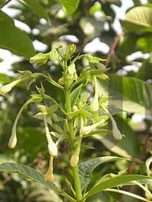SHAHEED KARTAR SINGH SARABHA AYURVEDIC MEDICAL COLLEGE & HOSPITAL
Affiliated to Guru Ravidas Ayurved University, Hoshiarpur Punjab
Affiliated to Guru Ravidas Ayurved University, Hoshiarpur Punjab

Botanical Name : lerodendrum serratum (Linn.)Moon
Family : Verbenaceae
Introduction : Bhargi is the classical drug used in the treatment of respiratory disorders.
Names in different Indian languages :
Hindi : barangi
Telugu : Gantubharangi
Tamil : sirutekku
Marathi : Bharangi
Gujarati : Bharangi
Kanada : gantabarangi
Malayalam : cerutekku
English : Blue-flowered Glory tree, Beetle Killer
Sanskrit : Bhaarngi
Synonyms :
Bhaarangi, Angaarvalli, Phanji, Braahmanyashtikaa, Kharshaak, Padma, Bhragubhavaa, Brahmayashtikaa
Classification according to Charaka, Susrutha & Vagbhata :
Charaka : Purisasangrahanisya
Susrutha : Pippalyidi
Vagbhata : Pippalyidi
Varieties & adulterants – (CV – controversy, AD – adulterants) :
1. C. indicum – Bhargi [CV]
2. C. serratum
3. Bhändirã – C. indicum [CV]
4. Pigmacopremna herbaca (Roxburg.) Moldenk -[CV]
5. C. infortunatum -[CV]
6. Siphonanthus indica -[AD]
Morphology :
A shrub, 1.5-3 m high, glabrous; hollow branches.
Leaves— simple, opposite, lanceolate,
Flowers— elongated terminal panicles; braces linear; calyx campanulate; corolla white, glabrous.
Fruits— drupes, blue.
Seeds— oblong.
Flowering and fruiting :
between May to October.
Distribution & Habitat :
Found commonly all over India.
Chemical Constituents :
serratagenic, oleanolic , queretaric acids, alpha-spinasterol , luteolin, apigenin, baicalein, scutellarein, phenolic acids,caffeic, ferulic acids, Hispidulin,glucuronides, scutellarein, uncinatone, pectolinarigenin etc.
Properties :
Rasa Tikta, Katu
Guna Laghu, Rüksa
Virya Usna
Vipãka Katu
Karma: Kapha-vatahara, Jvarahara, Kasahara, deepana, pachana
Antiasthmatic, antihistaminic, antispasmodic, antitussive carminative, febrifuge
Part Used :
Root
Dosage :
Powder 3-6 g.
Indications :
svãsa, Kãsa, sotha, Vrana, Krmi, Dãha. jvara, Pinasa
Asthma, cough, skin disease, leucoderma, fever.
External uses :
Bharngi is raktagami, vitiates blood and removes the obstruction in the circulatory channels and alleviates swelling. Hence leaves ground in a paste is used this paste is applied over lymphadenopathy. Leaf juice is applied on erysipelas.
Internal uses :
Digestive system : Being an appetizer. digesting and laxative, it is useful in anorexia, loss of appetite and gulma. Seed rubbed in butter-milk is useful in ascites.
Circulatory system : Raktagami. purifies blood, improves agni of rakta and alleviates oedema. It is therefore used in blood disorders like abscess caused by Vata, kapha etc
Respiratory system : Since it is snigdha and madhur, it acts as an expectorant. It is therefore useful in cough and hoarseness of voice. Raktagami. kaphanashak property is also helpful in cold and tuberculosis. Mixture of bharngi root juice and ginger juice is given in asthma to reduce the attacks of dyspnoea.
Reproductive system : In amenorrhoea. bharngi powder is used along with decoction of sesame seeds (Vaghbatta Chi. 34/120).
Skin : Diaphoretic.
Temperature : Being ama digestant, hot (diaphoretic), it is used in fever. Cooked vegetable of bharngi leaves is given in malaria.
Srotogamitva
Dosha : Alleviates kapha, vata.
Dhatu : Rasa, rakta. raktagami (rodhanashan).
Mala : Anthelmintic.
Organs : Respiratory -uterus (useful in fibroid, amenorrhoea).
Important Yogas or Formations :
Bharngiguda, Bharngyadi kwath. Bharngi sura. Bharngyadi Kasäya, Bharngi guda.
Important research work going on :
(1) anti-cholinesterase activity
(2) antihistamine activity
Therapeutic Uses :
(1) Vrikhsana vãta— Bharngi root is collected and pounded with Tusodaka. This is given orally to treat inguinal hernia (V.S.).
(2) svãsa— Bharngi and Sunthi are given with hot water or Sunthi, Bharngi and Suvarca lavana are to be given together (V. M)
(3) Gandamãlã— Application of Bharngi with Kãnjika
